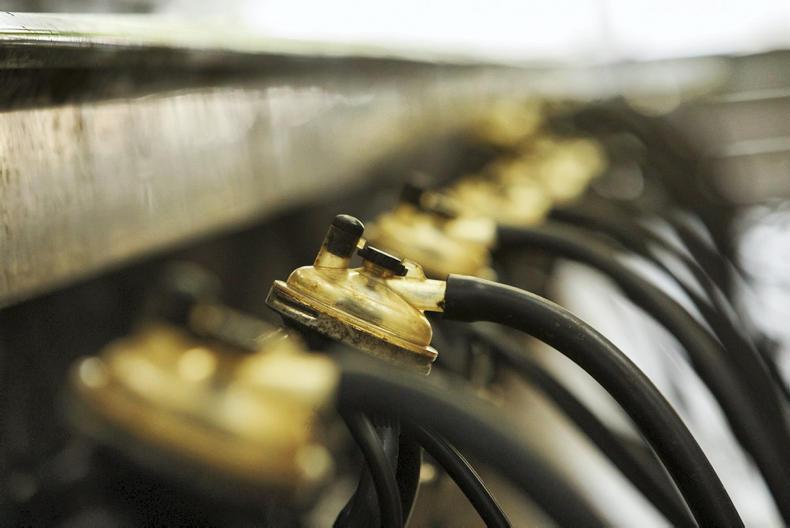Farmers must continue to take a proactive approach when it comes to reducing chlorates in milk, the head of Lakeland Dairies’ member relations team has said.
Speaking at a recent Smarter Milking event, Eamon Duignan highlighted that farmers cannot assume that what worked in the past will continue to work.
High standards
Citing high standards for infant formula and butter products, Duignan said the onus is on the farmer to eliminate chlorates and TCMs in milk. He added that chlorine residues in milk continue to be a challenge.
The presence of chlorates in milk powder is a serious threat
“You might be asking yourself what have chlorates got to do with milk quality and products.
"Infant formula is now a huge product for a lot of dairy companies and the presence of chlorates in milk powder is a serious threat.
“If there are high levels of chlorates in the powder, this can affect the iodine metabolism in infants as it affects the thyroid gland.
"Farmers have made great inroads, but it continues to be a huge challenge for the sector,” he said.
Good chlorate test
Duignan explained that a good chlorate test result ranges from 0 parts per billion (ppb) to 7ppb.
Milk supplied above this limit is not suitable for powder intended for infant milk formula.
Duignan outlined simple steps on how farmers can eliminate chlorates.
You have to rinse, rinse, rinse
“The main questions are why are there chlorine residues in milk and what can I do to stop it?
“You have to rinse, rinse, rinse.
"Ideally, you want to use 14 litres of water per milking unit to rinse the machine before circulating your detergent and then 14 litres of water per milking unit after the detergent has been circulated through the plant.”
He added that incorrect dosage rates, the over-recycling of cleaning detergents, using chlorine in the rinse water or for cluster dipping, the incorrect storage of detergents and stock piling of detergents are all issues that continue to be seen on farms.
“The message is as clear as it can be. Only use chlorine-free detergents.
"This is something that simply needs to be addressed,” he said.
Read more
Dairy farmers lifting 170t with one hand
Caustic causing problems as chlorine is banned
Farmers must continue to take a proactive approach when it comes to reducing chlorates in milk, the head of Lakeland Dairies’ member relations team has said.
Speaking at a recent Smarter Milking event, Eamon Duignan highlighted that farmers cannot assume that what worked in the past will continue to work.
High standards
Citing high standards for infant formula and butter products, Duignan said the onus is on the farmer to eliminate chlorates and TCMs in milk. He added that chlorine residues in milk continue to be a challenge.
The presence of chlorates in milk powder is a serious threat
“You might be asking yourself what have chlorates got to do with milk quality and products.
"Infant formula is now a huge product for a lot of dairy companies and the presence of chlorates in milk powder is a serious threat.
“If there are high levels of chlorates in the powder, this can affect the iodine metabolism in infants as it affects the thyroid gland.
"Farmers have made great inroads, but it continues to be a huge challenge for the sector,” he said.
Good chlorate test
Duignan explained that a good chlorate test result ranges from 0 parts per billion (ppb) to 7ppb.
Milk supplied above this limit is not suitable for powder intended for infant milk formula.
Duignan outlined simple steps on how farmers can eliminate chlorates.
You have to rinse, rinse, rinse
“The main questions are why are there chlorine residues in milk and what can I do to stop it?
“You have to rinse, rinse, rinse.
"Ideally, you want to use 14 litres of water per milking unit to rinse the machine before circulating your detergent and then 14 litres of water per milking unit after the detergent has been circulated through the plant.”
He added that incorrect dosage rates, the over-recycling of cleaning detergents, using chlorine in the rinse water or for cluster dipping, the incorrect storage of detergents and stock piling of detergents are all issues that continue to be seen on farms.
“The message is as clear as it can be. Only use chlorine-free detergents.
"This is something that simply needs to be addressed,” he said.
Read more
Dairy farmers lifting 170t with one hand
Caustic causing problems as chlorine is banned






 This is a subscriber-only article
This is a subscriber-only article









SHARING OPTIONS: